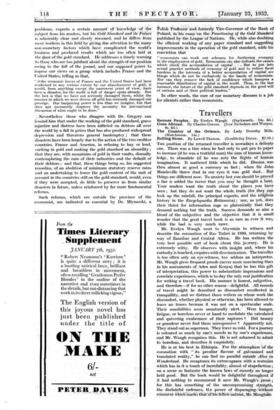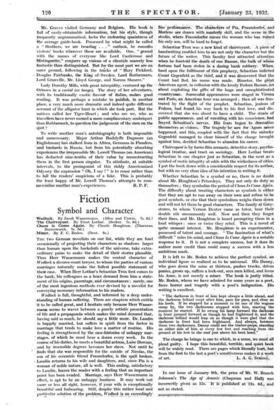Travellers
The Country of the Orinoco. By Lady Dorothy Mille. (Hutchinson. 15s.) THE position of the returned traveller is nowadays a delicate one. There was a tine when he had only to put pen to paper to increase (if he was a truthful man) the sum of human knoin- ledge, to stimulate (if he was- not) the flights of human imagination. It mattered little which he did. Illusion was then almost as good a currency as fact ; when Sir John Mandeville threw dust in our eyes it was gold dust. But things are different now. To anxiety lest you should be proved a liar is added the terror that you may be thought .a bore. Your readers want the truth about the places you have seen ; but they do not want the -whole, truth (for they can look up the rainfall, the principal exports, and the religious history in the Encyclopaedia Britannica); nor, as yet, does their thirst for information rage so platonically that they demand nothing but the truth. Success demands so nice a blend of the subjective and the objective that it is small wonder that the good travel book is as rare as ever it was, while the bad is very much rarer. Mr. Evelyn Waugh went to Abyssinia to witness and describe the coronation of Ras Tafari in 1930, returning by way of Zanzibar and Central Africa. He has written tile very best possible sort of book about this journey. He is extremely witty. He observes with insight and„ where his curiosity is touched, enquires with discrimination. The traveller is too often only an eye-witness, too seldom an interpreter. Mr. Waugh gives frequent proofs (never more convincing than in his assessments of Aden and Kenya) that he has this gift of interpretation, this power to substantiate impressions and correlate experiences, which is to-day the only real justification for writing a travel book. His manner is honest, subjective, and therefore—if for no other reason—delightful. All records of travel might be described as discomfort recollected in tranquillity, and we distrust those writers, on-whose work the discomfort, whether physical or otherwise, haS been allowed to leave no traces because it was not on a spectacular scale. Their sensibilities seem unnaturally • alert. Were hunger, fatigue, or boredom never at hand to modulate the calculated and quivering exuberance of their. raptures ?: Did beauty or grandeur never find them unresponsive ? Apparently not. They stand out as supermen. They leave us cold. For a journey is coloured as much by one's moods as by .one's experiences, and Mr. Waugh recognizes this. He is not ashamed to admit to boredom, and describes it exquisitely.
He is at his best in Ethiopia. For the atmosphere of the coronation with " Its peculiar flavour of galvanized and translated reality," he can find no parallel- outside Alice 'in Wonderland. He recaptures its extravagance with a restraint which has in it a touch of incrednlity, almost of stupefaction-; on a scene so fantastic the known laws of comedy no longer held good. But the book would be delightful throughout if it had nothing to recommend it save Mr. Waugh's prose ; for this has something of the uncompromising strength, the disdainful cadences, the power of disparaging, WIthout comment iihich'iriarkS ilitit‘of his fellbiv±satirist, Mr. Mau-ghat:1
' Mr. Graves visited Germany and Belgium. His book is full of easily-obtainable information, but his style, though frequently ungrammatical, lacks the endearing quaintness of the average guide-book. Possessed by what might be called a " Brothers, we are treading . . " outlook, he consults visitors' books wherever these are available. One, . " graced with the names of everyone like Lord Castlerosse and 44Iistinguette," conjures up visions of a clientele scarcely less fantastic than distinguished. But for the most part we are on Surer ground, following in the tricks of ." Mary Pickford, - Douglas Fairbanks, the King of. Sweden, Lord Rothermere, Lord Granville, Mr. Lloyd George, and Norma Shearer."
Lady Dorothy Mills, with great intrepidity, ventured up the Orinoco in a curial (or bongo). The story of her adventures,' with its traditionally exotic flavour of italics, makes good reading. It was perhaps a mistake, to publish, in another place, a very much more dramatic and indeed quite different account of the alligator hunt in which she took part. But the natives called her Tiger-Heart ; and who are we, who as travellers have never earned a more complimentary soubriquet than Rubberneck, to question the judgement of the men on the
. - - ••
To write another man's autobiography is both impossible and unnecessary. Major Arthur Reddy& Dugmore (an Englishman) has stalked lions in Africa, Germans in Flanders, and bustards in Russia, but from his potentially absorbing -experiences the-irrepressible Mr. Lowell Thomas (an American) has deducted nine-tenths of their value by reconstructing them in the first person singular. To attribute, at suitable intervals, to the protagonist of this richly Americanized Odyssey the expression " Oh, I say ! " is to rouse rather than to lull the readers' suspicions of a fake. This is probably the least happy of Mr. Lowell Thomas's attempts to com-
mercialize another man's experiences. R. P. F.





































 Previous page
Previous page